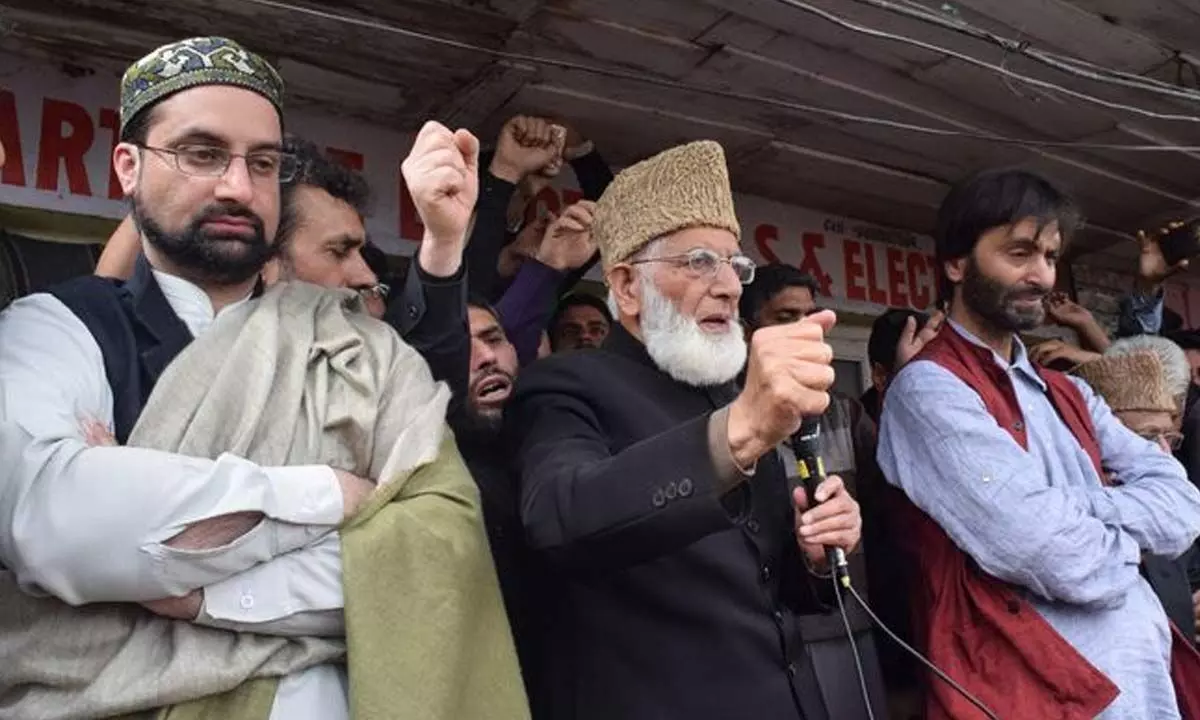The collapse of Hurriyat Conference

The collapse of Hurriyat Conference
Once a well-coordinated formidable separatist conglomerate, the so-called All-Party Hurriyat Conference (APHC) has suffered serial reverses, all in quick succession, in Jammu and Kashmir.
Once a well-coordinated formidable separatist conglomerate, the so-called All-Party Hurriyat Conference (APHC) has suffered serial reverses, all in quick succession, in Jammu and Kashmir. While about a dozen senior separatist leaders have faded into oblivion – some in jails for terror funding and other criminal acts and some under house arrest – five more died in the last 18 months.
Two of the top Hurriyat leaders have now decided to participate in the Union Territory's first Assembly elections by way of fielding their children in the fray. Well-placed sources said two senior leaders of the Hurriyat Conference faction headed by Mirwaiz Umar Farooq have decided to say good-bye to the 32-year-long separatist politics in the near future.
Rather than contesting the elections themselves, they would be fielding and supporting their children in the Assembly elections. One of them, who unsuccessfully contested the Assembly elections of 1977 on the Janata Party ticket, has decided to field his son from a segment in Central Kashmir. Another is known to have harnessed his daughter for the contest in North Kashmir.
If these sources are to be believed, the Hurriyat leader in North Kashmir is likely to field his candidates, including his daughter, from six segments in his district. He is currently building his liaison with some top-ranking politicians and government functionaries in New Delhi and simultaneously gearing up his cadre for the campaign at home. As and when this happens, it will be virtually the last nail in the moribund Hurriyat's coffin.
After a deadly car bomb blast, followed by withdrawal of J&K's special status in 2019, the BJP-led government at the Centre has either arrested a number of the top separatist activists or held them in home detention. The crackdown on the separatists began immediately after the dismissal of the Mehbooba Mufti government in June 2018 in which the BJP itself was a partner for over three years.
The decades-long police protection and bullet-proof vehicles from the separatists were withdrawn only after the blast in which 40 CRPF men were killed and dozens left injured on the Srinagar-Jammu highway near Awantipora.
Leaders like Shabir Shah, Nayeem Khan, and their fund operators had been already booked and arrested in a terror-funding case. Others, including Yasin Malik, were arrested and jailed only after the blast in February 2019. Around half-a-dozen of the senior separatist leaders including Mirwaiz Umar and Syed Ali Shah Geelani, were placed under house arrest.
Early this year, JKLF's Chairman and former "Chief Commander, Yasin Malik was sentenced to life imprisonment in the terror-funding case in which he played guilty to all charges without contest. Now trial is speedily underway in two high-profile cases against him – the kidnapping of Rubaiya Sayeed in December 1989 and the killing of the Indian Air Force personnel in January 1990."
The angel of death has been no less cruel against the separatists. One of the senior most leaders, namely Mohammad Ashraf Sehrai, died at a hospital in Jammu on 5 May 2021. Sehrai was next only to Geelani in seniority and influence among the separatists. Geelani (92) himself died a natural death in Srinagar on 1 September 2021. His death left a major vacuum in the separatist leadership as his most probable successor Sehrai had already died.
Sheikh Tajamal-ul-Islam (67), who as a leader of the Jamaat-e-Islami's student wing Islami Jamiat-e-Tulaba had called for – Iran-type Islamic revolution – in Kashmir in 1979, died in Islamabad, Pakistan, on 5 September 2021. During his over three-decade-long stay in Pakistan, he headed Kashmir Media Service and looked after PTV's Kashmir propaganda programmes. Among the overseas separatist activists, he was next only to Ayyub Thakur and Ghulam Nabi Fai.
Fantoosh (66), languishing as an accused in the terror funding case at Tihar Jail, died of renal cancer at All India Institute of Medical Sciences on 11 October 2022. His death marked the end of the separatist politics in Geelani's dynasty. Today, on 25 October 2022, another senior most separatist leader, Maulvi Abbas Ansari (86), who served two terms as the Hurriyat Chairman, died after a prolonged illness at his residence in Nawakadal, Srinagar. On the forefront of the separatist movement continuously since 1963, Ansari, a Shia Muslic cleric, played a key role in the formation of the Muslim United Front (MUF) in 1986 and the Hurriyat Conference in 1993.








